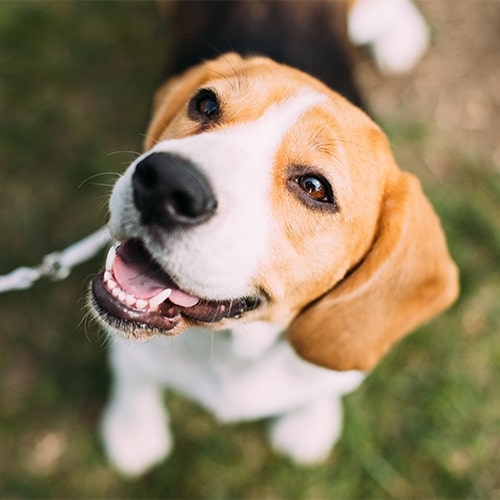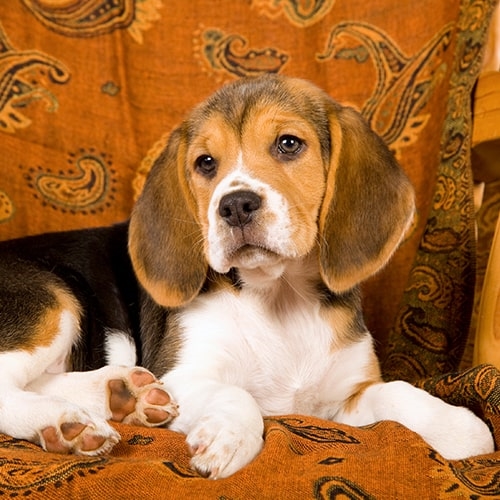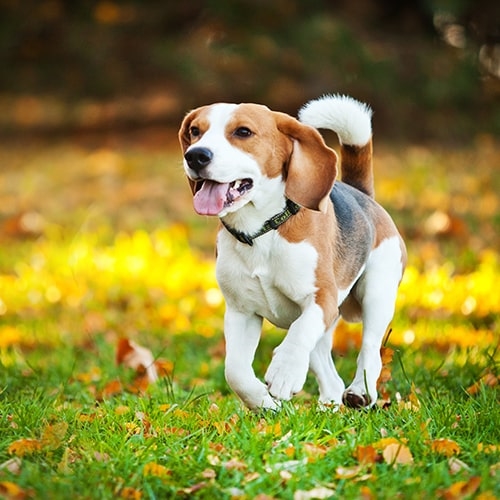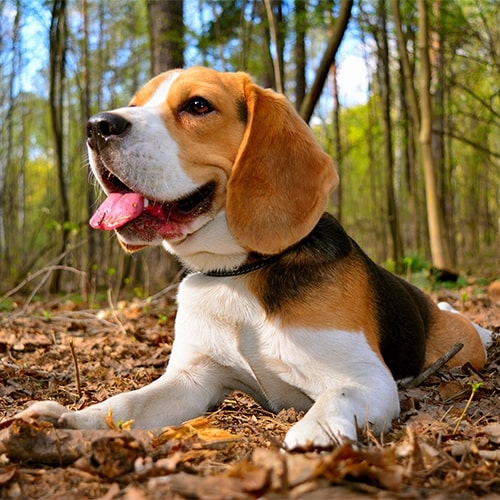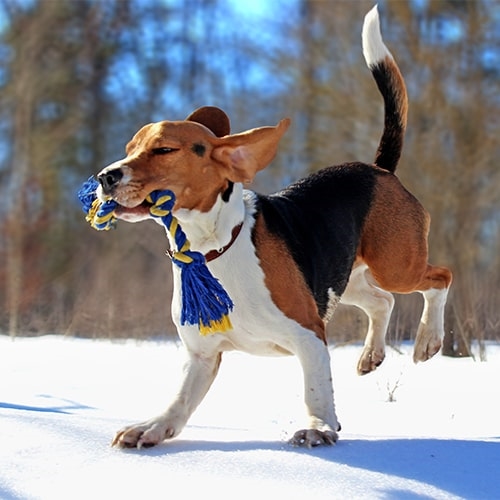| Size | Medium |
|---|---|
| Average height | 33-40 cm |
| Average weight | 9-11 kg |
| Average lifespan | Over 12 years |
| Minimum exercise (per day) | 1 hour |
| Coat length | Short |
| Minimum cost (per month) | £80 |
Beagles are loving and sociable dogs who enjoy nothing more than being involved in whatever is going on in the house. Although originally bred as scent hounds, they're very adaptable and as long as they get enough exercise are happy with city or country living.
Due to their size and adaptability, Beagles are really popular pets for families and first-time owners. They suit reasonably active homes where there is always someone around as they thrive off company.
Common health problems in Beagles
Beagles are really fantastic family pets but unfortunately, like many purebred dogs, they are prone to certain health issues. There are genetic health tests and screening for some of the problems Beagles can have.
If you’re thinking of buying a Beagle puppy, we’d recommend getting one from a Kennel Club Assured Breeder, as they will meet extra requirements including health screening. Parents having the relevant screening reduces the chances of your puppy being affected by these upsetting conditions. We’d also recommend discussing the medical history of your potential puppy’s parents and grandparents.
Some of the health conditions Beagles can develop due to their breed include:
- Epilepsy – a brain disorder which can lead to seizures.
- Meningitis – inflammation of the membranes surrounding the brain and spinal cord, causing fever and neck pain.
- Hypothyroidism – where the thyroid doesn’t make enough of the chemical that breaks down food into energy.
- Certain cancers.
- Intervertebral disc disease – abnormality of the discs that provide cushioning between the vertebrae (back bones).
- Some eye conditions, including cherry eye.
- Otitis Externa - where the ear canal becomes inflamed/infected, causing pain and irritation.
There are also four genetic conditions (with very complicated names) that the Kennel Club and we advise you make sure the puppies mum is checked for:
- Factor VII Deficiency (FVIID) – affects clotting ability.
- Imerslun-Gräsbeck Syndrome/ Cobalamin Malabsorption (IGS) – affects vitamin B12 absorption.
- Musladin-Lueke syndrome (MLS) – affects development of puppies.
- Neonatal Cerebellar Cortical Degeneration (NCCD) – affects movement and balance.
If you want to minimise the risk of your dog getting problems, you can read our advice on choosing a pedigree dog.
Caring for your Beagle
Beagles are great family pets but due to their strong hunting instincts they might not be the best dogs for homes with smaller pets. Beagles tend to be very tolerant and accepting by nature and so will fit into family life perfectly if well socialised from a young age.
Their size and affectionate personalities make Beagles a popular family pet but they can be quite high energy so always supervise your Beagle with children. Like any dog, they can be destructive when bored so make sure to keep their mind active with training and lots of exercise.
Beagles and barking
Beagles can be a little more vocal than other dogs when left alone so you may not realise they bark a lot. Try to avoid leaving them alone and if you have to make sure there is plenty to keep them occupied. If you’re having problems with excessive noise or barking, we recommend seeking the advice of an accredited behaviourist.
Training and socialisation
Beagles can be mischievous characters so it’s important to start positive, reward-based training as soon as possible to prevent them picking up bad habits. They are very intelligent dogs and are known to be wilful so you will need a firm but fair attitude when training – as always, consistency is key. If you aren’t an experienced trainer, or are a first-time dog owner, then you should ask for the help of an accredited trainer.
Beagles are family-oriented and love nothing more than getting stuck in at home. When left alone, Beagles can become distressed and bored which means they tend to bark a lot and may even chew things they shouldn’t. We wouldn’t recommend leaving your Beagle alone if you can avoid it. If leaving them is unavoidable, we would never recommend leaving your dog alone for more than four hours but even this may be too long for your Beagle.
Remember to socialise your Beagle as a puppy with lots of other dogs, different people and types of experiences.
Exercise
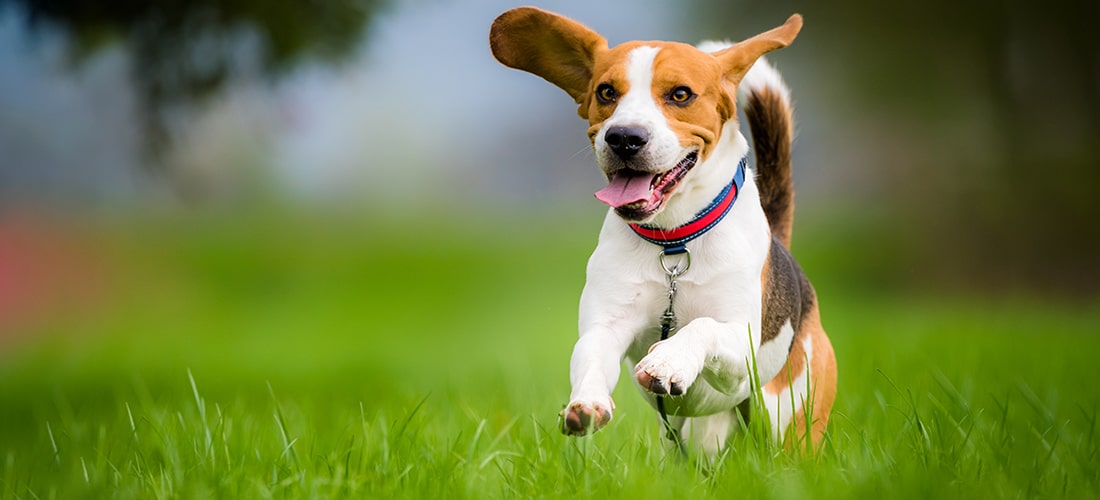
Beagles tend to be quite high energy and you’ll find they enjoy being part of everything their owners do. Whether you live in a city or the countryside, your Beagle will still need plenty of exercise to keep them happy and healthy. Beagles are good escape artists and love to climb and dig, so make sure your garden is Beagle-proof!
Your Beagle will need at least an hour and a half of exercise a day. We’d recommend a combination of walking and running for this. In addition, they’ll also need playtime, training and free time in a secure garden. Beagles are scent hounds, so they’ll really enjoy playing scent games with you and getting the chance to use their keen sense of smell.
When you’re out and about with your Beagle, it’s best to keep them on the lead unless you are somewhere secure they can run off-lead. Beagles sometimes suffer from selective hearing and you may find their recall isn’t so good if they catch the scent of something more interesting!
Grooming
As with most dogs, you can expect a reasonable amount of shedding from your Beagle however their coats are relatively low maintenance. A weekly brush should be plenty to keep on top of dead hair and keep their coat looking in tip-top condition.
Remember to keep an eye on your Beagle’s ears to make sure they are clean and dry to help prevent any ear infections.
Beagles and children
Due to their loving and tolerant nature, if socialised correctly from a young age Beagles suit family life really well. While Beagles are great family pets, you should always supervise your Beagle with children in case playtime gets too boisterous. Likewise, sometimes children can be too much for your Beagle so you need to make sure they have a space to go for time out where they won’t be disturbed.
Beagles and other pets
As long as your Beagle is well socialised, they will be fine around other dogs. You may even find that they love to spend time with other dogs.
If your Beagle has been socialised with other pets from an early age, they will be fine with other pets in the home although we don’t advise leaving them alone with smaller pets. Always make sure they are supervised with other pets in the home.
Food
Your Beagle’s diet will vary depending on their age, lifestyle and any health conditions they may have. You’ll need to feed them a complete, balanced dog food to keep them slim and healthy.
Your vet will be able to tell you how much your dog should be eating. You should feed a healthy Beagle a good quality, commercially available and complete dog food and it’s usually recommended to split their daily allowance into two meals. If you give your dog an occasional treat or use treats for training, remember to take this into account and reduce their daily allowance. Treats shouldn’t make up more than 10% of their calories or they can unbalance their diet.
You should try to feed your dog at the same time every day to get them into a routine. Remember to leave a gap after eating and before exercising.
The cost of owning a Beagle
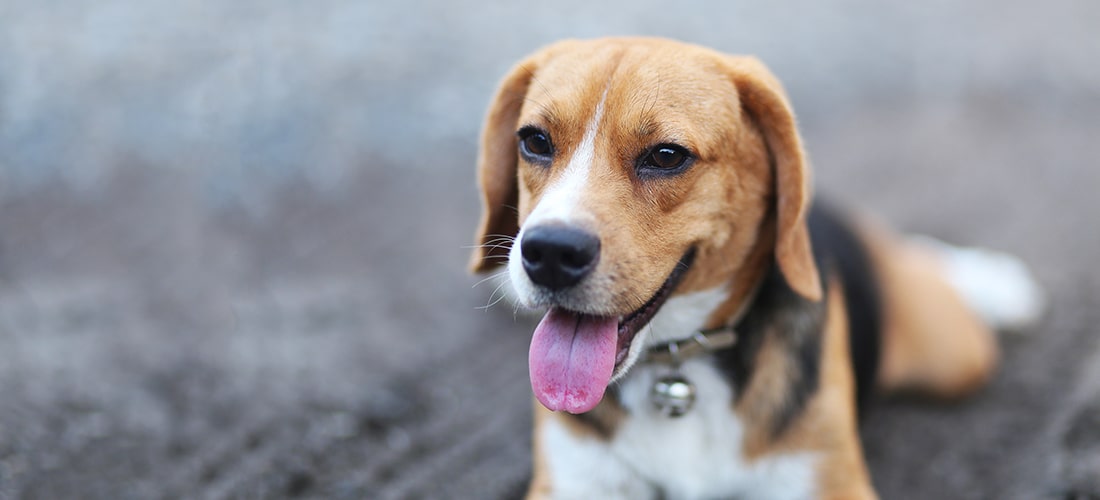
Having a Beagle will cost a minimum of £80 per month after purchase and set-up costs and up to £13,000 across their lifetime.
Costs you’ll need to think about include:
Purchase costs
Adopting an adult dog from a rescue centre may be a more cost-effective option, as well as having the added advantage of offering a home to a pet without one – check if the rehoming centre you’re looking at asks for a donation for rehoming.
If instead you’re buying a Beagle puppy from a breeder, you’ll need to factor in this cost. Beware unusually cheap puppies as they could come from a puppy farm. If you want to buy a pedigree puppy, we recommend looking for a Kennel Club Assured breeder as they have to do extra health tests and meet high standards.
Set-up costs
- Puppy vaccines – if you rescue a dog, reputable centres will often vaccinate them for you. Remember that ongoing booster vaccinations will be needed to continue their immunity.
- Neutering – you should usually arrange for your dog to be neutered at around six months old, though your vet will be able to advise you exactly when is best. Check prices at your local practice as these will depend on your vet and where you live. Some rescue centres will neuter any dogs they rehome, saving you this cost.
- Equipment – including a collar and tags, lead, harness, dog beds, dog bowls, pet-safe toothpaste and toothbrushes, grooming brushes and toys. Keep in mind that all these will need to be replaced with wear or damage or if your dog outgrows or damages them!
Ongoing costs
- Food.
- Preventive healthcare – budget for routine vet visits to help stop your dog getting ill and catch any problems early. They need annual check-ups, vaccinations and regular flea and worming treatments. Check if your vet offers a health care plan as this can help spread the cost throughout the year.
- Vet bills* or pet insurance – if you don’t have pet insurance and your dog needs veterinary treatment for an injury or illness, costs can rapidly mount up. Check what’s covered and what isn’t when comparing policies.
- Accessories – including lots of poo bags, replacing worn toys and grooming accessories, buying doggy toothpaste and any other extras they might need.
Other costs
- Training – basic training is very important and dogs can benefit from formal classes. Some dogs may have, or develop, behavioural problems which might need professional management.
- Boarding – you may also need to budget for boarding or dog sitting costs if you are planning to go away from home on holiday.
- Dog walkers/day-care – you might consider a professional dog walker to keep your dog happy and healthy if you’re unable to get out with your dog enough yourself, or to look after them during the day if you need to be out for more than four hours.
* It’s always better to plan ahead and budget or get pet insurance in case your pet gets injured or unwell. If you are having difficulty with veterinary costs, you can check if you are eligible for treatment at PDSA here.
If you’re considering pet insurance, our PDSA Pet Insurance could be a great option for you and it’s quick and easy to get a quote online.
Fun facts
- Beagles get their name from the Middle French “bee gueule” which means “wide throat” – this is often taken to mean “loudmouth”!
- One of the most famous Beagles is probably Snoopy from the Peanuts comic strip.
- Their sense of smell is one of the very best. They are often used in airports in the US and are even used to detect bedbugs.
- Originally, Beagles were much smaller than the ones we see today. “Pocket Beagles” are no longer a thing but predate the Beagles we know and love.
Getting a Beagle
Do plenty of research before you think about getting a Beagle. These family pets are loving and loyal and will need to get involved in everything you do. Make sure you have the time to give them training and socialising. No matter where you live, don’t forget that your Beagle will need lots of exercise to keep them happy and healthy.
Rehoming centres
There are plenty of rescue centres across the country where you may find a Beagle. Breed-specific rescues that specialise in Beagles are out there too. You’ll need to ask any rescue centre about the dog’s history to make sure they will be comfortable in your home. Good rescue centres should let you know of any health and behaviour problems.
Breeders
If you buy a Beagle puppy from a breeder, make sure your puppy will be well socialised and have all necessary health checks and vaccinations. We recommend looking for a Kennel Club Assured breeder as they meet higher standards. We’ve put together some advice to help you find a good breeder.

